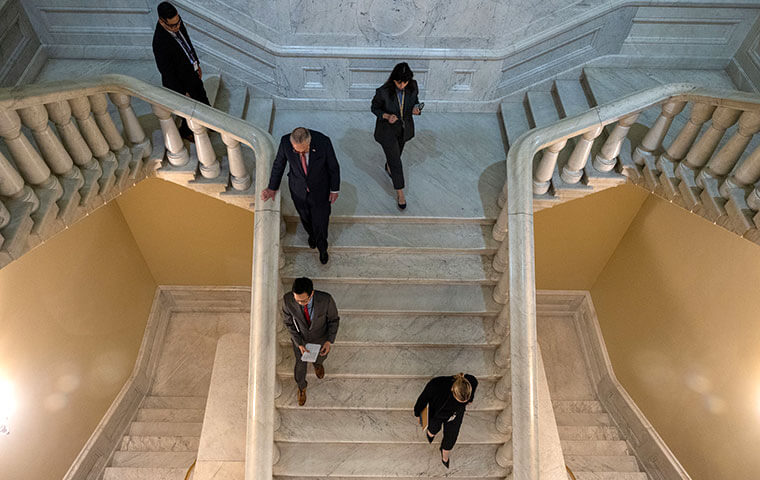 The ceiling will be reached in “early June, and potentially as early as June 1," the Treasury Department said Monday. Image: Nathan Posner/Shutterstock
By: FEDweek Staff
The ceiling will be reached in “early June, and potentially as early as June 1," the Treasury Department said Monday. Image: Nathan Posner/Shutterstock
By: FEDweek StaffThe focus on the fast-approaching need to raise the federal debt ceiling has shifted to the Senate, with hearings planned there on the potential impact on federal agencies, and the services they provide to the public, of a bill the House passed last week to increase the limit.
The House is on recess this week, with Republican leaders there saying they have done their share for now by passing that bill, which would raise the limit until sometime in early 2024 while revoking spending approved in 2021-2022 for Biden administration policies and by capping total agency discretionary spending for fiscal 2024 at fiscal 2022 levels.
DoD would be exempted from that cap, though, and given the growth in the DoD budget already enacted for the current fiscal year and projected for the upcoming one, that would translate into about a 22 percent cut at other agencies starting October 1. The bill further would allow total discretionary spending to increase by only 1 percent in 2025-2033 with DoD remaining exempt, putting still more pressure on the budgets of other agencies.
The Biden administration already has released assessments from a number of agencies showing potential furloughs, layoffs and hiring freezes in their workforces and reduced benefits and customer service in the programs they operate. The latter are likely will be central to hearings that Senate Democrats are planning, and already are the subject of messaging from the administration.
Senate Democratic leaders have said they won’t consider the House-passed bill, but what they might do as an alternative remains uncertain. Any counter-proposal originated there would require 60 votes to pass, meaning it would need at least some bipartisan support.
It is questionable, though, whether the House would be able to pass it in turn, given the hard line that some three dozen of the most conservative House members have taken.
The ceiling will be reached in “early June, and potentially as early as June 1,” the Treasury Department said Monday. “If Congress fails to increase the debt limit, it would cause severe hardship to American families, harm our global leadership position, and raise questions about our ability to defend our national security interests,” it said.
“We have learned from past debt limit impasses that waiting until the last minute to suspend or increase the debt limit can cause serious harm to business and consumer confidence, raise short-term borrowing costs for taxpayers, and negatively impact the credit rating of the United States,” its letter to Congress added.
OPM Advises Agencies on Conducting RIFs During Shutdown
Updated Shutdown Contingency Plans Show Range of Impacts
Use Shutdown as Justification for More RIFs, OMB Tells Agencies
Unions Win a Round in Court Disputes over Anti-Representation Orders
Deferred Resignation Periods End for Many; Overall 12% Drop
Senate Bill Would Override Trump Orders against Unions
See also,
How to Handle Taxes Owed on TSP Roth Conversions? Use a Ladder
The Best Ages for Federal Employees to Retire
Best States to Retire for Federal Retirees: 2025

